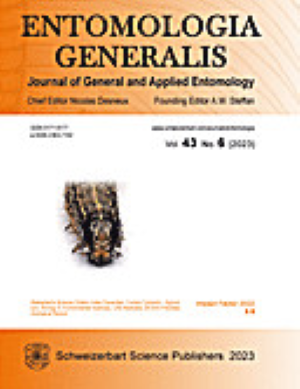修剪可以恢复欧亚大陆中部受木蠹蛾 Agrilus mali 侵害的野生苹果林的健康
IF 4.6
1区 农林科学
Q1 ENTOMOLOGY
引用次数: 0
摘要
入侵的苹果木蠹蛾 Agrilus mali Matsumura(鞘翅目:Buprestidae)威胁着中国新疆野生苹果林的生存,危及欧亚大陆中部苹果种质资源的保护。修剪有虫害的枝条可以降低各种害虫爆发的可能性并减少相关损失,但其治理苹果蠹蛾的效果和可行性尚未得到充分研究。因此,我们研究了 2018 年和 2019 年商业果园在一年中三个不同时间修剪枝条的功效。在2016-2019年的五年间,我们评估了修剪对野生苹果林中苹果蠹蛾(A. mali)长期可持续管理的功效。秋季修剪导致修剪过的枝条上所有未成熟的苹果蠹蛾全部死亡,单棵树的开花量增加,害虫密度和树木对景观的破坏显著减少。模拟模型显示,一次适时的修剪处理至少可以在 6-10 年内保持较低的害虫密度。循环修剪计划可能是一种有效的长期管理工具,可以抑制野生苹果林中的苹果蠹蛾种群,促进生态系统的恢复。事实证明,这种实用的方法有助于管理苹果蠹蛾和维持生态系统健康,尤其是在欧亚大陆中部野生苹果林未来面临入侵的情况下。本文章由计算机程序翻译,如有差异,请以英文原文为准。
Pruning can recover the health of wild apple forests attacked by the wood borer Agrilus mali in central Eurasia
The invasive apple wood borer Agrilus mali Matsumura (Coleoptera: Buprestidae) threatens the viability of wild apple forests in Xinjiang, China, imperiling the preservation of apple germplasm resources in Central Eurasia. Pruning infested branches can reduce the likelihood of outbreaks of various pests and associated damage, but its efficacy and feasibility for managing A. mali has not been well-studied. Therefore, we examined the efficacy of pruning at three different times of the year in commercial orchards in 2018 and 2019. We evaluated the efficacy of pruning for longer-term sustainable management of A. mali in wild apple forests over a five-year period from 2016–2019. Autumn pruning resulted in mortality of all immature A. mali in pruned branches, increased flowering in individual trees, and a significant reduction in both pest density and tree damage on the landscape. Simulation modeling showed that a single well-timed pruning treatment could maintain low pest density for at least 6–10 years. Recurring pruning schedules may be an effective long-term management tool, suppressing A. mali populations in wild apple forests and facilitating ecosystem recovery. This practical tactic could prove instrumental in managing A. mali and sustaining ecosystem health, particularly in the face of future invasions in wild apple forests in central Eurasia.
求助全文
通过发布文献求助,成功后即可免费获取论文全文。
去求助
来源期刊

Entomologia Generalis
生物-昆虫学
CiteScore
7.10
自引率
18.80%
发文量
72
审稿时长
>12 weeks
期刊介绍:
Its scope covers all aspects of basic and applied research dealing with insects and more broadly with arthropods inhabiting wild, agricultural and/or urban habitats. The journal also considers research integrating various disciplines and issues within the broad field of entomology and ecology.
Entomologia Generalis publishes high quality research articles on advances in knowledge on the ecology and biology of arthropods, as well as on their importance for key ecosystems services, e.g. as biological control and pollination. The journal devotes special attention to contributions providing significant advances (i) on the fundamental knowledge and on sustainable control strategies of arthropod pests (including of stored products) and vectors of diseases, (ii) on the biology and ecology of beneficial arthropods, (iii) on the spread and impact of invasive pests, and (iv) on potential side effects of pest management methods.
Entomologia Generalis welcomes review articles on significant developments in the field of entomology. These are usually invited by the editorial board, but proposals may be sent to the Editor-in-Chief for preliminary assessment by the editorial board before formal submission to the journal. The journal also considers comments on papers published in Entomologia Generalis, as well as short notes on topics that are of broader interest.
 求助内容:
求助内容: 应助结果提醒方式:
应助结果提醒方式:


